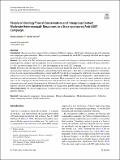People or ideology? : Social conservatism and intergroup contact moderate heterosexuals’ responses to a state-sponsored anti-LGBT campaign
Abstract
Introduction Recent years have witnessed the global rise of illiberal regimes, which built widespread support by initiating hate campaigns against minorities. This research examined a government-led anti-LGBT campaign in Poland and its impact upon attitudes of the wider public. Methods Our study (N = 2061 heterosexual participants) assessed sexual prejudice (blatant dehumanization and modern homonegativity) and pro- and anti-minority action intentions in two representative surveys, conducted before (fall 2018; N = 821) and after (summer 2019; N = 1240) the beginning of the anti-LGBT campaign. Results Prejudice and anti-minority action tendencies increased during the analyzed period. However, there was also an increase in pro-minority action tendencies, demonstrating public resistance. These effects were moderated by respondents’ levels of social conservatism and their prior contact with LGBT people. Low (compared to high) levels of social conservatism reduced (or even reversed) the impact of the state-sponsored anti-LGBT campaign on sexual prejudice, which further translated into pro- and anti-minority collective action intentions. High (compared to low) levels of contact predicted a reduced effect of the campaign on blatant dehumanization, which translated into lower anti-minority action tendencies. Blatant dehumanization and modern homonegativity differentially predicted participants’ willingness to engage in pro- and anti-minority collective action, highlighting the importance of taking a more granular approach when predicting action intentions. Policy Implications We discuss implications for interventions aimed at protecting vulnerable groups in the face of anti-minority rhetoric.
Citation
Gorska , P & Tausch , N 2022 , ' People or ideology? Social conservatism and intergroup contact moderate heterosexuals’ responses to a state-sponsored anti-LGBT campaign ' , Sexuality Research and Social Policy . https://doi.org/10.1007/s13178-022-00783-y
Publication
Sexuality Research and Social Policy
Status
Peer reviewed
ISSN
1868-9884Type
Journal article
Description
Funding: Preparation of this manuscript and the research it reports were supported by the National Science Centre (Poland) 2017/26/M/HS6/00689 and 2017/25/HS6/01116 grants conferred to the first author.Collections
Items in the St Andrews Research Repository are protected by copyright, with all rights reserved, unless otherwise indicated.

